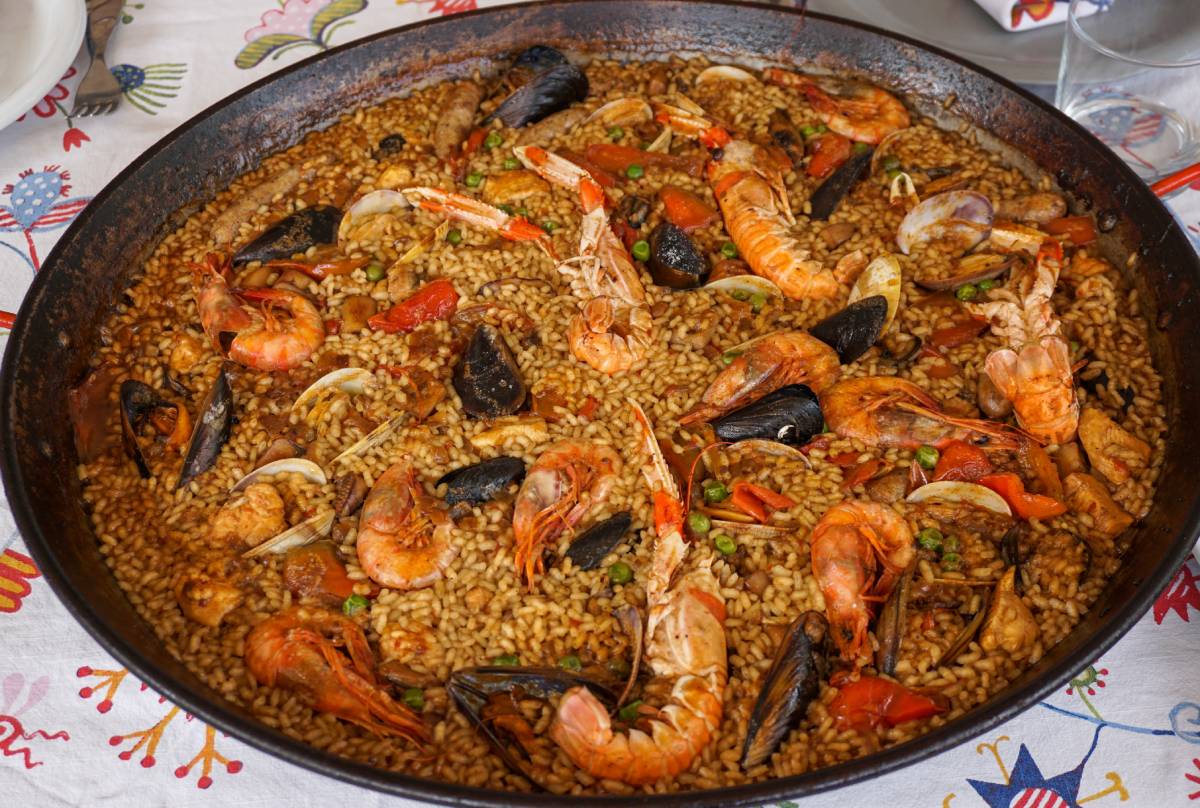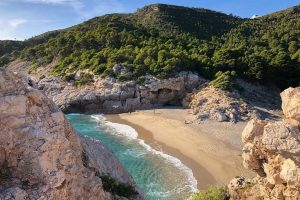Fun Facts Spain
Spain is one of the hottest tourist destinations in Europe. It has a lot to offer, from the idyllic beaches at the coast to historical cities, wonderful weather, rich culture and delicious cuisines. It is also known for its music, games, and generally happy people. You will definitely come back for more. Before you pack your bags for this wonderful land of the rabbits, let’s share some interesting facts about Spain.
Contents
Spain’s Mesmerizing Architecture
Spain has fascinating architecture, which includes numerous UNESCO World Heritage Sites. Some of the most popular pieces of building art that dot the land include the Alhambra in Granada, the Sagrada Familia in Barcelona, and the historic city of Toledo. The country’s diverse architectural styles reflect its rich history and influences from the Roman, Moorish, Gothic, Renaissance, and modernist periods, leaving visitors in awe of its stunning structures. The amazing architecture attracts over a million tourists each year.
Barcelona: A City of Diverse Marvels
Barcelona is renowned for its unique and stunning architecture, which dates back several centuries. Some of the notable architecture is the iconic work of Antoni Gaudí. The city is home to the breathtaking Sagrada Familia, Park Güell, and Casa Batlló, showcasing Gaudí’s distinctive style and leaving visitors in awe. Barcelona also offers beautiful beaches, vibrant markets, and a vibrant nightlife, making it a must-visit destination in Spain. There are several other Barcelona fun facts that make it the ultimate tourist destination.
Madrid: Spain’s Vibrant Capital
Madrid, the capital of Spain, is a city that never sleeps. It is known for its lively atmosphere, world-class museums like the Prado Museum, and beautiful parks like Retiro Park. The city hosts numerous cultural events, including the San Isidro Festival, where locals celebrate Madrid’s patron saint with bullfights and traditional music. Madrid’s culinary scene is also exceptional. You get to enjoy various regional dishes and delicious tapas.
La Tomatina: The World’s Biggest Food Fight
La Tomatina is an annual food fighting festival held in the town of Buñol. Here, participants engage in a massive tomato fight. The festival has gained worldwide fame and attracts thousands of tourists who gather to throw over 100,000 tomatoes at each other in a fun and messy spectacle. It’s such a unique and entertaining event that cements Spain’s penchant for vibrant and unconventional celebrations.
Spain’s Diverse Geography
Here are fun facts Spain hides in its geography! Spain is situated on the Iberian Peninsula in southwestern Europe. It boasts a diverse geography that includes stunning coastlines, majestic mountains like the Sierra Nevada, and picturesque islands like the Canary Islands. Its proximity to North Africa also adds a touch of exoticism to its landscapes and climate. Visitors have a wide range of natural wonders to explore.
Flamenco: Passionate Dance and Music
Flamenco is an art form deeply ingrained in Spanish culture. It’s known for music, passionate dance and soulful and heartfelt singing. The dance originated in the Andalusian region and is a captivating expression of emotion and storytelling. It combines intricate footwork, rhythmic handclapping, and powerful vocals to create a mesmerising performance. This fun facts Spain is a perfect reflection of the intensity and passion of the Spanish people.
Spanish music extends beyond flamenco, with diverse genres such as classical guitar, regional folk music, and modern pop. However, Spanish music has a special flavour that gets people dancing.
Spanish Language and Diversity
The official language of Spain is Spanish, or Castilian. It is spoken by millions of people worldwide and is the second most spoken language globally. 21 countries have made it their official language too. It is estimated that over 460 million people worldwide speak Spanish. Therefore, learning Spanish opens doors to cultural exchanges, business opportunities, and a deeper understanding of Spanish-speaking countries’ rich heritage.
However, the country has various regional languages, such as Catalan, Basque, and Galician. The language diversity reflects the country’s diverse cultural heritage and regional identities.
Spain’s Gastronomic Delights

Here are fun facts Spain about its food. Spanish cuisine is renowned for its rich flavours and includes many dishes. Visitors have several options, from the famous paella and tapas to regional specialties like jamón ibérico and pintxos. Spain offers a culinary experience that delights your taste buds. Each region has its own food traditions and uses specific local ingredients. If you are a food lover, this is a paradise you would love to explore.
Ratoncito Pérez: The Spanish Tooth Fairy
In Spanish folklore, Ratoncito Pérez is the equivalent of the tooth fairy. According to the story, when children lose a tooth, they place it under their pillow, and Ratoncito Pérez comes at night to collect the tooth. They leave a small gift or money in exchange. This weird legend has been passed down through the centuries.
Festivals and Celebrations

Spain has vibrant and lively festivals that celebrate various traditions and cultural events. From the running of the bulls in Pamplona during the San Fermín festival to the extravagant Carnival in Tenerife, these celebrations bring people together to enjoy music, dance, parades, and a vibrant atmosphere that showcases Spain’s love for fiestas. There are festivals for every season throughout the year. Therefore, visitors get a glimpse of the amazing culture no matter when they visit the country.
Spain’s Long Life Expectancy
Spaniards enjoy one of the highest life expectancies in the world. Their long lives are fuelled by various factors, including a Mediterranean diet rich in fresh fruits, vegetables, olive oil, and fish, along with a relaxed lifestyle. Besides, Spain emphasises social connections, strong family ties, and a laid-back approach to life, all of which play a role in the country’s impressive life expectancy statistics.
Don Quixote is a Literary Icon of Spain
Don Quixote, a novel written by Miguel de Cervantes, is one of the names you will hear when exploring Spanish literature. This iconic novel tells the story of an imaginative knight who hopes to uphold justice by embarking on a quest to revive chivalry. Don Quixote’s adventures and his loyal squire, Sancho Panza, have become symbols of idealism and perseverance. It touches on the fabric of the local culture, which makes it an icon in society.
Canary Islands Are A Tropical Paradise:

The Canary Islands sit off the northwest coast of Africa, across the Spanish archipelago. They are known for their volcanic landscapes, stunning beaches and pleasant year-round climate. They also have a unique blend of Spanish and African influences, and offer diverse ecosystems, including lush forests, dramatic cliffs, and vibrant marine life. This is a paradise for nature lovers and sun-seeking tourists.
A Country of World Records
Spain holds several notable records, such as being the second-most visited country in the world and attracting millions of tourists with its diverse attractions and warm hospitality. It is also the largest producer of olive oil globally and home to the largest Gothic cathedral, Seville Cathedral, and the third-largest natural park, the Teide National Park in Tenerife. These records reflect Spain’s vast offerings and its status as a global leader in various domains.
Spain’s Autonomous Communities
Spain is divided into 17 autonomous communities. Each community has a distinct culture and history, food, traditions, and languages. Some popular ones include the Basque Country, Galicia, Catalonia, and Andalusia. Visitors can explore these autonomous communities to get a feel for the richness and uniqueness of each region within the broader Spanish identity. The communities are intertwined in some ways and provide an amazing cultural experience across the land.
A Member of the European Union
Spain is an active member of the European Union (EU). Therefore, it takes part in all union activities, including political, economic, and social affairs. Members of the EU enjoy trade, travel, and cooperation. Spain has greatly benefited from this economically and enhanced its stability. The membership has also provided opportunities for Spanish citizens to study, work, and live in other EU countries, fostering cultural exchange and diversity.
Spain’s Flamboyant Festivals
Spain has some of the most vibrant and colourful festivals you will ever find anywhere. They include the world-famous Running of the Bulls in Pamplona and the lively Feria de Abril in Seville. These festivals are so much fun and attract visitors from around the globe. Expect an immersive experience that may include spectacular parades, traditional costumes, or exuberant music and dance.
Spain’s Passion for Football

Spaniards generally love football. Some of the world’s most successful football clubs, such as Real Madrid and Barcelona FC, come from Spain. If you are a football lover, you may watch a match when you visit the country.
Stadiums like Madrid’s Santiago Bernabeu and Barcelona’s Camp Nou attract fervent fans that create an electrifying atmosphere during matches. La Roja, the national team, has also been successful. It won the FIFA World Cup in 2010 and the UEFA European Championship multiple times. Football unites Spaniards and ignites a shared sense of passion and pride.
From mediaeval castles to modernist masterpieces, Spain boasts a remarkable architectural legacy. The Alhambra in Granada, the Sagrada Familia in Barcelona, and the Royal Palace in Madrid are just a few examples of Spain’s architectural wonders. The country’s diverse architectural styles reflect its rich history and influences from the Roman, Moorish, Gothic, Renaissance, and modernist periods, leaving visitors in awe of its stunning structures.
Spain’s Fascinating History
Spanish society has existed for centuries. Therefore, it has a rich and complex history that has influenced its cultural heritage. It goes as far as the Roman Empire, Moorish rule, the Spanish Inquisition, and the golden age of exploration. During these periods, Spain witnessed significant historical events. Its historical sites, such as the Alcazar of Segovia and the Roman Theatre of Mérida, offer a glimpse into its captivating past.
Spain’s Enchanting Islands
Apart from the famous Canary Islands, Spain has other enchanting island destinations. These Balearic Islands include Ibiza, Mallorca, and Menorca. Visitors to the islands enjoy stunning beaches, vibrant nightlife, and picturesque landscapes. These islands attract sun-seekers, nature enthusiasts, and party-goers alike, offering a diverse range of experiences in a Mediterranean paradise.
Spanish Art and Masterpieces
Over the centuries, Spain produced many incredible artists who are still household names in the world of art. They range from the fascinating works of Pablo Picasso and Salvador Dalí to the surrealism of Joan Miró. The Prado Museum in Madrid and the Picasso Museum in Barcelona house exquisite collections, allowing visitors to appreciate Spain’s artistic heritage.
Spain’s Diverse Natural Landscapes
Apart from the islands, Spain has a diverse landscape, ranging from the majestic Pyrenees Mountains to the rugged cliffs of the Costa Brava and the stunning beaches of the Costa del Sol. This is a country of contrasts, with lush green valleys, arid deserts, and breathtaking national parks like Picos de Europa and Doñana National Park. Visitors explore Spain’s natural wonders to connect with nature and witness its awe-inspiring beauty.
Spanish Inventions and Innovations
Spain has significantly contributed to the world of innovation and invention. The modern mop, the submarine, and the folding fan are among the inventions credited to Spanish inventors. Additionally, Spanish scientists and researchers have made advancements in various fields, including medicine, astronomy, and renewable energy. These contributions highlight Spain’s commitment to innovation and its impact on global progress.
Spain’s Love for Siesta

Here is another of the cool but weird facts about Spain. The siesta, a short afternoon nap, is deeply ingrained in Spanish culture. Traditionally, businesses and shops close during the afternoon hours, allowing people to rest and recharge before continuing with their day. The siesta reflects the Spanish approach to balancing work and leisure, emphasizing the importance of relaxation and maintaining a healthy lifestyle.
Spanish Fashion and Design
Spain is a renowned fashion and design hub. Most of its talented designers have already made their mark on the international stage. This country has high-end couture and avant-garde creations and combines traditional elements with contemporary flair. Cities like Barcelona and Madrid host renowned fashion events and showcase the country’s talent, cementing Spain’s position in the global fashion industry.
Spanish Hospitality and Warmth
Spaniards are known for their warm hospitality and friendly nature. Visitors to Spain often remark on the welcoming atmosphere and genuine friendliness of the locals. You will love the interaction, whether it’s engaging in lively conversations at a neighbourhood bar or receiving heartfelt recommendations from a hotel concierge. The warmth of the Spanish people leaves a lasting impression on visitors and creates memorable experiences.
Spain’s Film Industry
Spain has a thriving film industry that has produced internationally acclaimed directors, actors, and movies. Spanish cinema spans various genres, from the works of renowned directors like Pedro Almodóvar to critically acclaimed films such as “Pan’s Labyrinth” and “The Secret in Their Eyes.” These contributions to the film industry have earned it recognition at prestigious film festivals and a dedicated global following.
Spain’s Automotive Heritage
Spain has a notable presence in the automotive industry, with renowned brands like SEAT and Hispano-Suiza originating from the country. SEAT, in particular, has become one of Europe’s leading automobile manufacturers. Spain’s automotive heritage shows a commitment to innovation and craftsmanship.
Time-Honoured Traditions:
Spain has several time-honoured traditions, passed down through generations. Some fascinating ones include the solemn processions of Holy Week in Seville and the lively street parades of Carnival in Tenerife. These traditions showcase Spain’s cultural heritage and are deeply rooted in its history. When combined with festivals and sports culture, you get to experience an amazing and diverse experience.
Spain Has the Highest Number of Bars Per Capita in the World
Yes, you read that right -Spain has the highest number of bars! With approximately one bar for every 132 people, it’s no wonder that the Spanish have a vibrant and lively social scene. It is one of the fun facts they love! From quaint local taverns known as “bares” to trendy cocktail bars and traditional “bodegas,” the options are endless.
Spaniards usually gather at these establishments to enjoy lively conversations, sample delicious tapas, and cool down with diverse beverages. The bar culture in Spain is truly unique, creating a sense of community and providing the perfect setting for socialising, unwinding, and immersing oneself in the rich flavours and traditions of Spanish cuisine and drinks.
Madrid is the Land of Royalty
Here are a few fun facts about Madrid: First, it is home to one of the world’s largest royal palaces, the Royal Palace of Madrid. This magnificent palace has over 3,400 rooms and is the largest functioning royal palace in Europe. It serves as the official home of the Spanish royal family.
Second, it is home to the green oasis of El Retiro Park. The park spans over 350 acres and features lush gardens, beautiful sculptures and a large lake where visitors can rent rowboats. There is even an amazing glass palace called the Crystal Palace. One more fun facts Spain! There are also about 248,000 trees along its streets.
The Legend of the Ghostly Ship
We close with one of the weird facts about Spain: the legend of the ghostly ship. For over 150 years, there have been eerie sightings of a ghostly ship known as “El Buque Fantasma.” According to the legend, this phantom ship appears off the coast of the Basque Country, particularly near the town of Bermeo. Locals claim to have heard the disembodied voices of the sailors and witnessed the eerie glow emanating from the ship.
What are 3 important facts about Spain? It culture, history and political orientation! There are many more interesting and cool facts about Spain and individual regions. Pay a visit to this incredible country and experience fun facts Spain firsthand!




